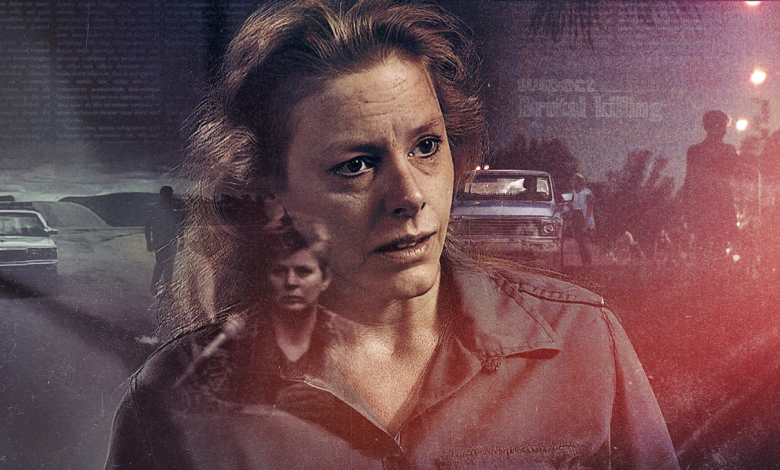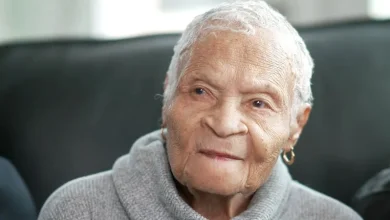‘Aileen: Queen of the Serial Killers’ (2025) Docu Review – Dead Johns and a Murderess – Abstract AF!

Sneha Jaiswal (Twitter | Instagram)
As an Indian viewer who is more familiar with serial killers like Charles Sobhraj, Mohan Kumar, and Cyanide Mallika, I didn’t know jack Aileen Wuornos, the focus of ‘Aileen: Queen of the Serial Killers’, the 2025 true-crime documentary. In-fact, within the first fifteen minutes of the documentary, I kept thinking about how either Hilary Swank or Charlize Theron would make interesting picks for live-action adaptation of the criminal’s life. Funny, because Charlize won an Oscar for playing her in the 2003 film ‘Monster’, a title I know of, but haven’t seen.
The title seems to be inspired by one of the tabloid headlines that appeared when Aileen’s case was under media attention, labeling her the “killer queen.” Aileen was 34-years-old at the time of arrest, suspected of murdering at least seven men, while working as a sex worker along Florida’s highways. Her girlfriend at the time, Tyria Moore, helped the authorities get a confession out of Aileen.
A judge who presided over the case poses an interesting question: The suspect serviced over 200 “Johns” (American slang for men who pay for sex) in a year, so why did she kill only seven? The documentary doesn’t directly answer that, though it drops plenty of crumbs for viewers to draw their own conclusions. And If you take Aileen at her word, she claims the first murder was an act of self-defense, not premeditated, and that after that, she claims to have vowed to herself that she wouldn’t take any aggression lying down.
Filled with real life courtroom footage, police tapes, old interviews of Aileen, and several media clips covering the case, the documentary surprisingly doesn’t feature many new interviews. This is largely a profile of ‘America’s first woman serial killer’, perhaps that’s why the tabloid anointed her ‘killer queen’. Through archival footage, we see investigative reporter Michelle Gillen uncovered key details about the murders, facts conveniently overlooked by those eager to see Aileen in the electric chair.
Journalist Michele Gillen interviewing Aileen (Netflix)
Interestingly, the documentary opens with a voice-over, a recording of a police captain who sniggers, “I honestly don’t know how anybody could be attracted to that.” He refers to the woman as “that,” dehumanizing her and casually exposing his own sexist bias. You can sense the derision in his tone without even needing to know who he’s talking about.
In one of the court recordings, an attorney questions the absurdity of a sex worker claiming she was raped and attacked, to which Aileen fires back, saying she knows no one will believe her simply because of her profession. It reminded me of Netflix’s Gone Girls: The Long Island Serial Killer, which explores how a man got away with murdering several prostitutes for years, simply because nobody cares when a sex worker goes missing.
Violence and abuse within the profession are well-known realities, and sex workers are far less likely to report an assault. Yet, a 2015 Huffington Post article on sex work revealed that “one in five police reports of sexual assault from an urban U.S. emergency room were filed by sex workers. Sex workers were younger, poorer, and suffered a greater number of injuries than other victims.” So imagine the number of cases that go un-reported.
“She was like the trifecta. Gay, female, sex worker, and killing white man. So very easy to execute with no conscience,” a filmmaker states about her. These were the same reasons why the case invited a media frenzy, making Aileen both a celebrity and public villain. The killings were heavily politicized, becoming the focus of several debates on gender, violence, and death penalty.
Like I wrote, this documentary is more of a true-crime profile of the infamous killer, than a deep dive into the case, victims, and what the families had to say. So for viewers who already know about the serial murderess, this Netflix offering might not have much in terms of new insights. It also comes across as lopsided, with several affected parties having no representation. Still, the documentary serves as a compelling think piece on how sex workers are perceived, and whether Aileen was born a “monster” or pushed into becoming one by childhood abuse, trauma, and circumstance.
For me, the novelty factor was high, besides, since almost all the footage is from before 2002, it feels like you’re watching a long news feature from the 90s. But that grainy retro factor might not make engaging viewing experience for those who are used to high-definition videos. Overall, I’d say, this is an interesting addition to the true-crime docu genre, but only because I haven’t seen any other documentaries (and there are plenty of them) on the same subject.
You can stream ‘Aileen: Queen of the Serial Killers’ on Netflix.
Also Read: ‘The Summer Hikaru Died’ Review: 2025’s Best Horror Anime (Audio Version Below)





